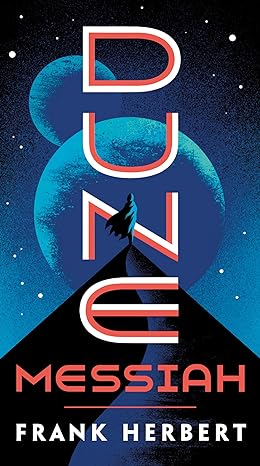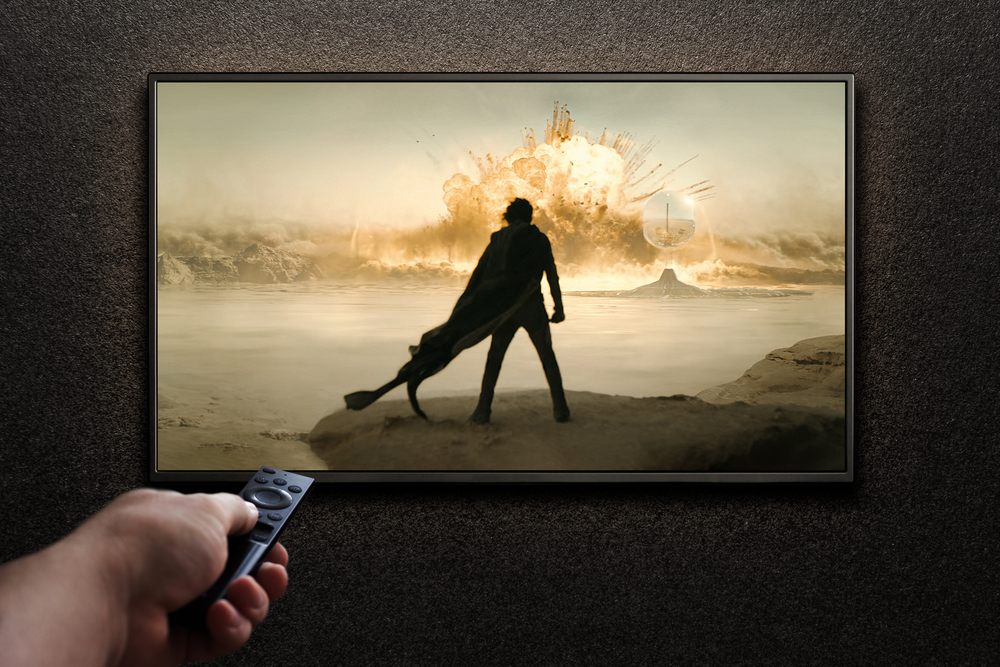Warning: There will be spoilers in this post for the plot of Dune, including plot points from the second book that will serve as the basis for the as-yet unmade third movie.
The recently released Dune: Part 2 has been a big box-office success, as was the first movie. These two movies were based on the first book in the series, and it’s been confirmed that the second book, Dune Messiah, will serve as the basis for a third movie. I first read Dune in my early teen years and have re-read it several times since then. I also re-read the book prior to watching each of the two most recent movies, to maximize my ability to notice and be annoyed by everything the movie changes from the book. (Don’t ask me why I do this to myself, I don’t fully understand it either!) I’ve also recently re-read Dune Messiah, even though the third movie won’t arrive for at least a few years. There has also been a lot of online discussion about a key element of the Dune story – is Paul Atreides the hero of the story, or is he a villain?

To briefly summarize, with the secret assistance of the Emperor and his feared Sardaukar army, House Harkonnen launches a massive attack that all but wipes out House Atreides. Paul, the son of Duke Leto Atreides, and his mother, the Lady Jessica, narrowly escape and are taken in by the Fremen, a civilization that has lived natively on the harsh desert planet of Arrakis for thousands of years. The Bene Gesserit, an all-female religious order to which Lady Jessica belongs, had implanted among the Fremen (as well as other civilizations through the galaxy) the seeds of legends and prophecies to help make those populations more susceptible to control. The wing of the Bene Gesserit responsible for this process, the Missionaria Protectiva, puts these superstitions in place to ensure that if any member of the Bene Gesserit is trapped among these societies, they can leverage the implanted beliefs to put themselves in a position of authority and ensure their own security. The Fremen come to see Paul as a savior fulfilling one of these manufactured prophecies, and he quickly ascends to a position of authority among the Fremen. The Fremen, having spent generations living and surviving in the harshest conditions in the galaxy, become a fighting force that outmatches even the Emperor’s seemingly invincible Sardaukar army. The first book (and second film) end with Paul ascending to the Imperial throne, deposing the Emperor and bringing about the downfall of House Harkonnen. In the second book (and presumably in the third movie) we learn some of the consequences of Paul’s ascendancy to the throne.
With Paul’s reign, the Fremen are set out on the galaxy determined to spread the religion of Muad’Dib (Paul’s Fremen name). By the time all is said and done, over sixty-one billion people have been killed, ninety planets have been rendered sterile and over five hundred others devastated, and the followers of over forty other religions have been completely wiped out. Paul estimates his reign has brought about more destruction than any before and any that will follow, and that the galaxy will spend a hundred generations recovering. Paul’s regime is despotic, bloodthirsty, and brings about devastation.
The author, Frank Herbert, considered the story of Paul Atreides (and the Dune series more generally) to be a cautionary tale against the idea of messiahs, strong leaders, and so-called “great men.” Paul became a messiah and an icon of devotion, and this only precipitates an unprecedented wave of destruction. And some people interpret the story of Paul Atreides as the rise of a villain – perhaps the literary embodiment of Lord Acton’s dictum that “absolute power corrupts absolutely.” But I interpret things differently.
I don’t see the story of Paul Atreides as an example of a good person corrupted by power. (To be clear, I do think power is corrupting even of good people, but that’s not what I take from the story of Dune.) Instead, I see it as a critique of the idea that power becomes less dangerous if it’s wielded by good people. Paul comes to power as good person and continues to be a good person even after taking power. But nonetheless, he cannot wield this power to do good – he finds, to his despair, that every path he takes leads to tragedy and devastation.
Paul Atreides does not seek to bring about the atrocities that come about as a result of his reign. On the contrary, he desperately wishes to prevent things from happening the way they do. Paul is a good and noble person, motivated by a strong sense of justice. He has been raised with Mentat training, which gives a person superhuman mental abilities akin to a living supercomputer. He becomes the first male to fully gain the powers and abilities of the Bene Gesserit, and gains prescient abilities allowing him to see how possible futures and timelines unfold. And even in the first book, he begins to glimpse the future that awaits him:
Somewhere ahead of him on this path, the fanatic hordes cut their gory path across the universe in his name. The green and black Atreides banner would become a symbol of terror. Wild legions would charge into battle screaming their war cry: “Muad’Dib!”
It must not be, he thought. I cannot let it happen.
But he could feel the demanding race consciousness within him, his own terrible purpose, and he knew that no small thing could deflect the juggernaut. It was gathering weight and momentum. If he died this instant, the thing would go on through his mother and his unborn sister. Nothing less that the deaths of all the troops gathered here and now – himself and his mother included – could stop the thing.
Of course, Paul cannot spontaneously manufacture the deaths of himself, his mother, and an entire Fremen army on the spot. And thus, the terror unfolds.
In the minds of some people, great power can serve great good, as long as the power is in the hands of the right kind of person. But in Herbert’s saga, this turns out to be false. Paul Atreides is not corrupted by the power he gains, nor does not crave power for its own sake. If ever anyone could be trusted with absolute power and to bring about good results with it, it should be Paul Atreides. Here we have someone who is sincere, well-intentioned, harboring a strong sense of justice, and who has the benefits of superhuman mental abilities and prescient foresight. And yet, in the story of Dune, even someone like Paul Atreides can’t wield absolute power without devastating results. The problem isn’t that power corrupts good people – the problem is with power itself.


READER COMMENTS
robc
May 1 2024 at 11:22pm
I haven’t read past here yet, and to avoid spoiling my answer with what you said, I am going ahead and giving my answer…he is an anti-hero.
BTW, I read the first 4 books, I enjoyed God Emperor (despite, or maybe because of, how weird it is) but no longer cared about the universe at that point, so stopped reading.
robc
May 1 2024 at 11:31pm
Having read the rest, Bravo! A great interpretation.
steve
May 2 2024 at 10:32am
Agree with anti-hero, but one faced with a steady stream of bad choices and people genuinely out to subvert or kill him.
Steve
robc
May 1 2024 at 11:33pm
I have done it too. Starship Troopers was the worst to do it with.
john hare
May 2 2024 at 3:13am
Yes that movie was truly horrible if one understood the book. Actually it was horrible under any conditions.
Kevin Corcoran
May 2 2024 at 10:57am
Starship Troopers was one of the worst offenders as far as adaptations go. Here is, from what I can tell, an exhaustive list of what the movie actually reflects from the book:
1: There is a war with an insect-like race who are referred to as “Bugs” as a shorthand.
2: Several characters in the movie have the same name as characters from the book.
3: [This section intentionally left blank]
Paul LoSchiavo
May 2 2024 at 5:24am
The answer to the question, “was Paul the/an hero?”, is, yes and no. Muad’dib was elevated to hero status by his adopted Fremen. To the spacing guild, the bene Gesserit, and the rest of the Imperium he was, quite understandably, not an hero. As a disrupter to the status quo and an usurper to the throne, he represented chaos, uncertainty, and the probable loss of power and prestige. No one in the known universe wanted the seat of power to be relocated to Arrakis, not even the Fremen. The jihad which erupted after his accension was an unintended consequence of his new found need to control and administer an humanity that had, itself, become degenerate and petrified. The spacing guild would be the first to submit to his rule because of their absolute dependence on the huge quantities of spice for their operations. Since he controlled the very source and distribution of that essential resource, the guild had little alternative but to capitulate. Then the Landsraad had to fall in line in order to keep their Choam alliances turning over with trade and commerce. This put the Atreides in a position wherein they didn’t really have to have an overwhelming army at their disposal to keep order, they merely had to administer the whole shebang in a more just and equitable fashion. The old politics of intrigue and subterfuge wasn’t going to go away but the Atreides made certain that every seat at the table suffered and benefitted equally. The jihad wasn’t needed to bring all into line, it was simply the inevitable response to the generations of suffering and neglect the Freman people experienced under the old regime. Paul himself eventually accepts the reality that the resultant structure and dynamics of the emerging government weren’t going to achieve any kind of stability or endurance. Thus, the horrible but inevitable need to adopt the “Golden Path” as the only way out of the chaos, was forced upon him. It was his own reluctance to take the necessary steps to begin that future which sent him into the desert to become the preacher and leave the legacy to his number two son. This is where Herbert senior arrived at the same conclusion that every historian, politician, and sense maker has done from the beginning. The concept of the benevolent tyrant emerges as the only viable system for managing humanity efficiently and effectively. But because human life spans are so ephemeral, the only realistic solution is to designate a leader who can transcend one human lifetime. The way that Asimov did in “Foundation” and as Mr. Herbert does here.
Comments are closed.